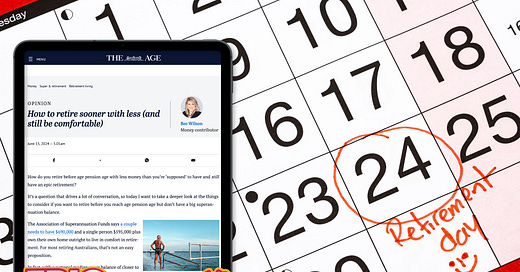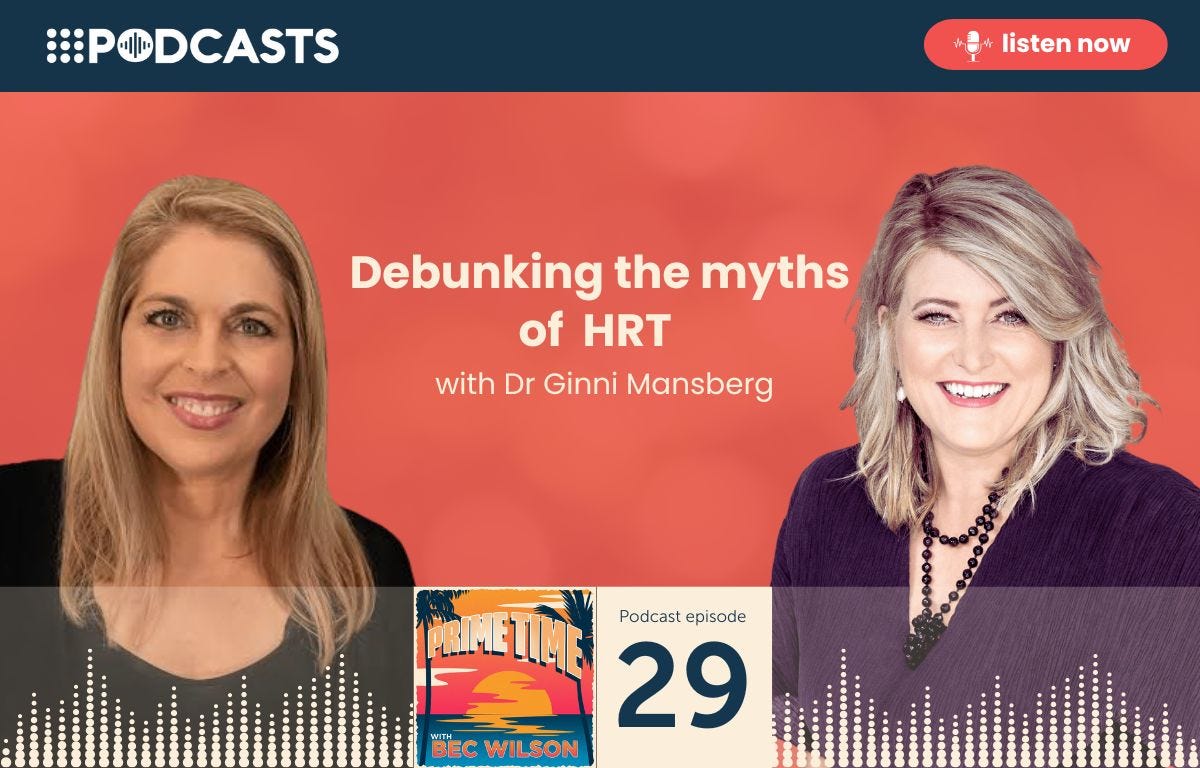How do you retire sooner with less? | Setting your retirement date: smart ideas
A jam packed epic retirement newsletter for the 16th June 2024
In this edition
There’s just one massive newsletter each week now, so sit back and have a Sunday read!
Feature: Setting your retirement date: Some smart ideas
From Bec’s Desk: A cold southern week
In today’s Newspapers: How do you retire sooner with less (and still be comfortable)
Prime Time podcast: Debunking the myths of Hormone Replacement Therapy (HRT) with Dr Ginni Mansberg
First, our wonderful sponsor, Viking Cruises, has got an amazing deal for our Primetimers and Epic Retirees!
Save up to $4,600 per couple on Viking's 2024-2026 river cruises
Discover more of the world with an award-winning Viking river cruise.
Meander the rivers of Europe through picturesque cities and towns, enjoying the old-world castles, rolling vineyards and charming historic sites that pass you by. Set sail along the Nile past ancient pyramids and palaces. Travel the winding Mekong of Southeast Asia through tranquil jungles and fishing villages, or Journey along the mighty Mississippi and explore the diverse food, culture and landscapes of the USA.
Experience the most extraordinary way to see the world and book your river voyage before 31 July 2024 to save up to $4,600 per couple. *T&C's apply.
Setting your retirement date: Some smart ideas
When you’re finally choosing your retirement date - the date when you walk out of your full-time or part-time job for the last time, there’s a lot of little things to consider.
And, if you’ve been working for one employer for some time and are eligible for long service leave, or, the Christmas or Easter holidays are approaching, the date you choose to retire can quite sizeably impact how much money you leave on the table. So when you pick that date it makes sense to consider a few things, with the goal of minimising your tax and maximising the money you take home with you.
Now remember, I’m neither a tax adviser nor a financial adviser, I just speak in fact and point to things so you can do more personal research yourself. So if you want to get help interpreting it to your situation - speak to an accountant or financial advisor yourself and ask the questions.
Here’s my tips.
Maximise your tax free threshold income and lower tax bracket income
Currently, in the 2023-2024 financial year, you can earn up to $18,200 without paying any income tax. If you're planning to retire but still have some capacity left to earn at low tax levels, it's worth making the most of this tax-free threshold. Even if you earn more than $18,200, the income between $18,201 and $45,000 is taxed at a lower rate (19%). Therefore, working a bit longer in the year could still be advantageous, allowing you to add more money to your retirement savings with minimal tax impact.
From July 1, 2024, the Stage 3 tax cuts will come into effect, changing the tax brackets. While the tax-free threshold remains at $18,200, the income between $45,001 and $200,000 will be taxed at 30-37%.
If your earnings fall within this range, it might be worth considering delaying your retirement until after July 1, 2024, to take advantage of the lower tax rate. However, it's crucial to balance this potential tax benefit against your life choices and retirement goals. Always consult with a financial advisor to tailor decisions to your specific situation.
Strategically use any long service leave
If you're fortunate enough to have accrued long service leave, consider taking it before your official retirement date rather than getting paid out for it. People do this for three reasons:
Continued salary and superannuation contributions: During the long service leave period, you continue receiving a normal salary, and you also receive superannuation contributions on that salary, effectively increasing your overall retirement savings. If the leave were paid out as a lump sum, the superannuation component might not be included.
Enjoying a break while building savings: You can take a well-deserved break from work while still building up your nest egg. Additionally, you may remain insured for Total and Permanent Disability (TPD) and income protection if your company provides these benefits during your leave period.
Accruing additional leave: During your long service leave, you may continue to accrue annual leave and sick leave which would not have been paid out. Annual leave can be paid out when you finally retire, adding another boost to your savings.
Time your retirement carefully around holidays
When planning a retirement date, think about retiring after the big seasonal holidays rather than before. Many people choose to retire after the Christmas or Easter holiday periods to maximise the holiday pay and extra benefits that come from being employed during them. It makes sense to maximise the money they take home, simply by delaying retirement a week or two.
There’s more - read this article in full here.
From Bec’s Desk: A cold southern week
I’m fresh off a week on planes speaking in Melbourne, Sydney then Brisbane! It’s glamorous on the first day, and maybe the second. But by the fourth day everything in your little suitcase is dirty, it doesn’t repack well and you’re dreaming of cuddling your puppy-dogs on the couch! I love the speaking bit! And the smiling faces curious about an epic retirement. The cold weather south of Queensland - not so much! 😆 In the week just gone I presented a speaking tour about the future needs and wants for retirement housing and retirement living to rooms full of property people hosted by Colliers. Very interesting discussions were had about how developers meet the needs of ‘modern, epic retirees’. And, I presented a case study of the Epic Retirement framework and course to the Association of Superannuation Funds Victorian Conference. A warm reception indeed.
Week two of the Epic Retirement Flagship Course Winter Edition is underway. It’s the week where people learn about the age pension, budgeting and how much you need to retire in comfort. So everyone is digging into the lessons hard. If you’re keen, our next course kicks off on 8th August - and you can find out more and book an earlybird rate place on the program here.
My Sydney Morning Herald/ The Age article last weekend kept going all week - the most read article I have ever written (in the newspaper) with HUNDREDS OF THOUSANDS of reads! Yes really! If you missed it here it is. “There are four different types of retirees: Which one are you?”
And our podcast with Dr Ginny Mansburg debunking the myths of hormone replacement therapy was a ripper. So many of you wrote me lovely notes of thanks afterwards (makes me and my producer feel awesome when you do that as I share them with her too!). If you’re loving the podcast - can I ask you to help us spread the word.
The Epic Retirement Club Facebook Group is growing like a weed! And I’m loving the conversations! More than 40,000 people now! That’s wild.
And my book is now #1 on Amazon in about 6 categories: Personal Retirement Planning, Taxes, Accounting Specialties, Pensions and more. You can order it on Amazon here.
Finally, don’t forget to send me your letters. You can always email me at bec@epicretirement.com.au. Until next week… make it epic!
Many thanks! Bec Wilson
Author, podcaster, guest speaker, retirement educator … Visit my website for more info about me, here.
How do you retire sooner with less (and still be comfortable)
This article was first published in The Age, The Sydney Morning Herald, WA Today and the Brisbane Times.
How do you retire before age pension age with less money than you’re ‘supposed’ to have and still have an epic retirement?
It’s a question that drives a lot of conversation, so today I want to take a deeper look at the things to consider if you want to retire before you reach age pension age but don’t have a big superannuation balance.
The Association of Superannuation Funds says a couple needs to have $690,000 and a single person $595,000 plus own their own home outright to live in comfort in retirement. For most retiring Australians, that’s not an easy proposition.
In fact, with a national median super balance of closer to $212,000 for men and $202,000 for women at the age of 65, understanding the levers you have at this point of life becomes seriously important.
Build your balance sheet
We have to start with the hardest task, the one thing that most people detest doing – talking the truth about their money and what it will afford them. And, really considering how much they are willing to tighten their belts over the years ahead to ‘go early’ into retirement.
There are two steps to this process. Take a moment to build your own personal balance sheet. Be brutally honest with yourself. Understand your assets and your liabilities first.
How much is your house worth? How much is in your super fund? And how much is in your partner’s super fund, knowing that in retirement couples usually work as a ‘household’ rather than as individuals to make considerable cost-of-living savings. Have you got any income generating assets or other assets outside super?
What debt are you carrying? How much is still owing, and how long will it take you to pay that down or, how much do you need to find to clear that debt?
Create your budgets
Next, we need to talk about your budgets, pre- and post-retirement. That means mapping out your core living expenses and your lifestyle expenses today and in the future life you want to live in retirement.
Save up little holidays, or a caravan that can make holidaying affordable and easy. And get out there and enjoy your life.
Then you’ll need to look at your income sources today, and in retirement too. Once you have your budget, ask yourself some tough questions. Are you living within your means or do you need to adjust your spending?
Are you saving, or paying down debt with your income today that will not have to be paid off after retirement?
Assess your income generating potential from super
Once you understand your current financial position and your budgets, you must project how much income you think you’ll be able to generate from money you have in superannuation, and how much investment risk you are prepared to take on to generate this income.
A simple way to look at it is that a couple, both with median super balances might have about $414,000 between them in super, which at a 7 per cent return might be able to generate $28,980 in annual income without eating into the capital. We know that’s not enough to live on, but it’s a start – and it can form the first part of our picture.
Understand your pension eligibility
The second part of your income picture comes from learning about the age pension. The age pension is not a dirty word. More than 60 per cent of Australians over 65 draw on the age pension.
It’s a powerful and often essential layer of income for retirees, but it can’t be accessed until the age of 67 and can only be accessed if you pass both the assets and the income test, which many people with a lower super balance and limited complexity pass.
It’s important to understand the age pension early if you’re aiming to access it as it could affect some of the strategic decisions you make about when to sell your home and how much cash to free up for income generating via super.
If you’re going to be eligible for the full pension at 67, you can expect to gain an income of almost $43,000 for a couple or $29,000 for a single person in income, when you reach pension age.
There’s more to this article…
You can read the rest of this article here in today’s The Age, and the Sydney Morning Herald today. It is not behind their paywall, but you may need to sign into their website to read it.
Debunking the myths of Hormone Replacement Therapy (HRT) with Dr Ginni Mansberg
This week it’s a show specially for women, (and men who want to learn about what women are going through in midlife and beyond). Today we’re talking about menopause, HRT and the modern and evolving science on how both affect our bodies in midlife and beyond with the author of The M Word, Dr Ginni Mansberg, a GP who specialises in menopause and women’s health.
Whether you hit menopause before it became trendy in 2021 or after, there’s a lot to know about your hormones, hormone replacement therapy (HRT) and your health in the second half of life.
Dr Mansberg walks us through the science of menopause, explaining the important studies that have changed practical recommendations on HRT over the last 30 years. And then she dives into all the things we need to know about the 53 symptoms caused by the changing levels of oestrogen in our bodies as menopause unfolds. We talk about peri-menopause, actual menopause and post menopause and the way treatments work in each phase. And then we go deeper again – into menopausal weight gain, and what we can do about it; and when we should slow down or even stop our HRT, or if we should stop it at all.
LISTEN HERE:












